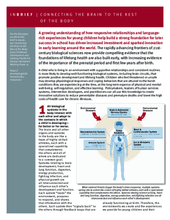Displaying 641 - 650 of 2509
This article describes the first United States-based national study to compare the rates of substantiation of maltreatment among cases reported to child protective services involving caregivers with and without disabilities.
This paper chronicles the goals of the partnership and the planning and implementation of the Child Protection Training Academy, developed by the Illinois Department of Children and Family Services and the University of Illinois Springfield in the U.S.
This study sought to better understand the network characteristics of homeless young adults with a history of foster care.
Because social networks have been shown to impact behavioral health outcomes, this study sought to better understand the network characteristics of homeless young adults with a history of foster care.
The goal of this study is to identify predicative indicators that will assist in the development of a home study that will increase consistency within home studies and decrease timeliness of completion.
A mixed method correlational exploratory pilot was conducted in Washington State to determine items within the home study assessment that could be used as indicators to identify baseline requirements of the assessment and suggest anticipated depth (expansion or reduction) within the required topic(s).
Based on 39 semi-directed individual interviews with social workers from child welfare services, the current study aims at highlighting how social workers come to the decision to remove a child from parental care, and how they choose a foster family.
This study extends our understanding of use of failure to protect (FTP), a sub-type of neglect, by examining who workers substantiate for FTP, in what context, and the justifications they use.
This brief describes some of the "compelling evidence that the foundations of lifelong health" are built in the early years of life, "with increasing evidence of the importance of the prenatal period and first few years after birth."
This paper explores how college graduates with foster care histories fare after graduating from a 4-year college that offered a campus-based program.

